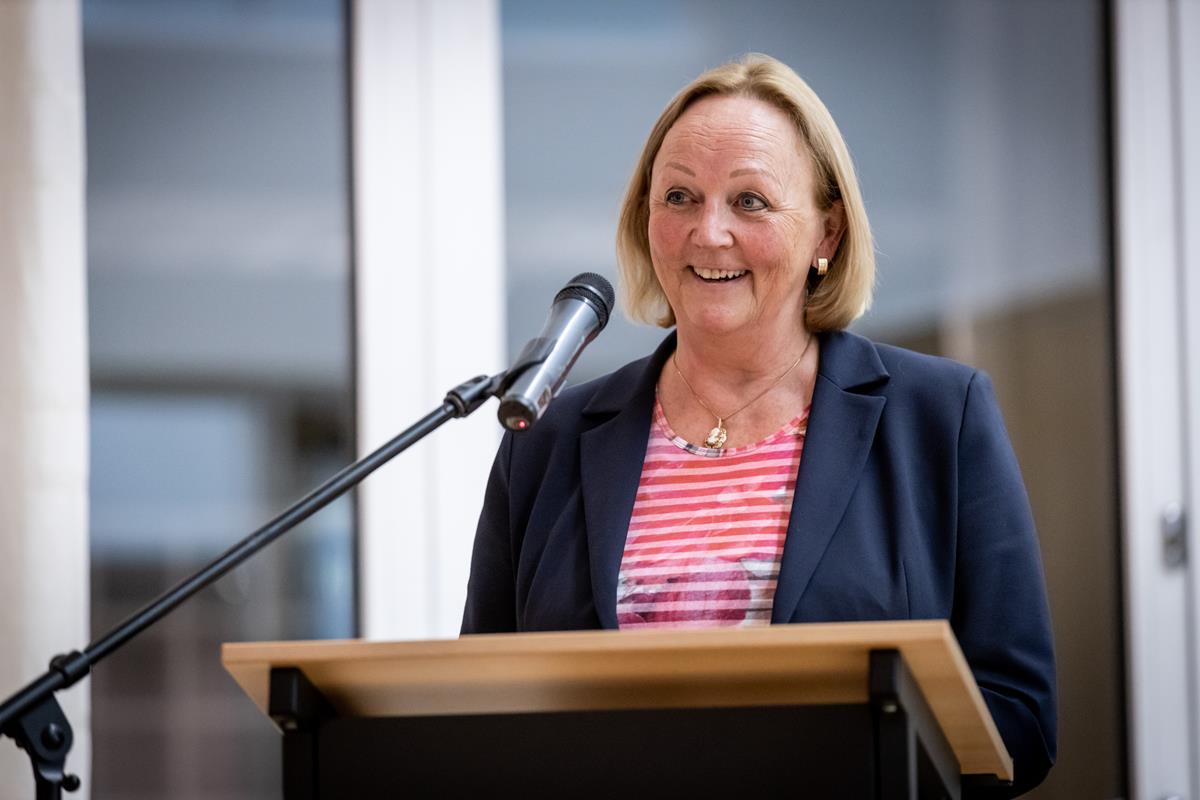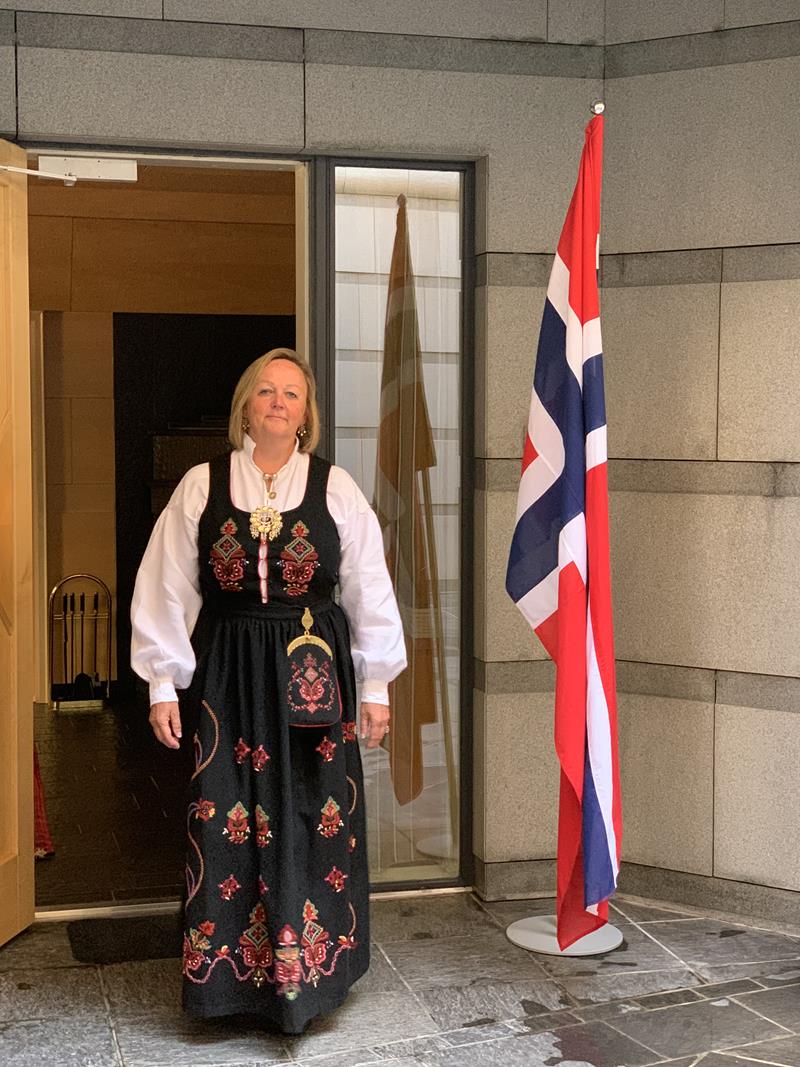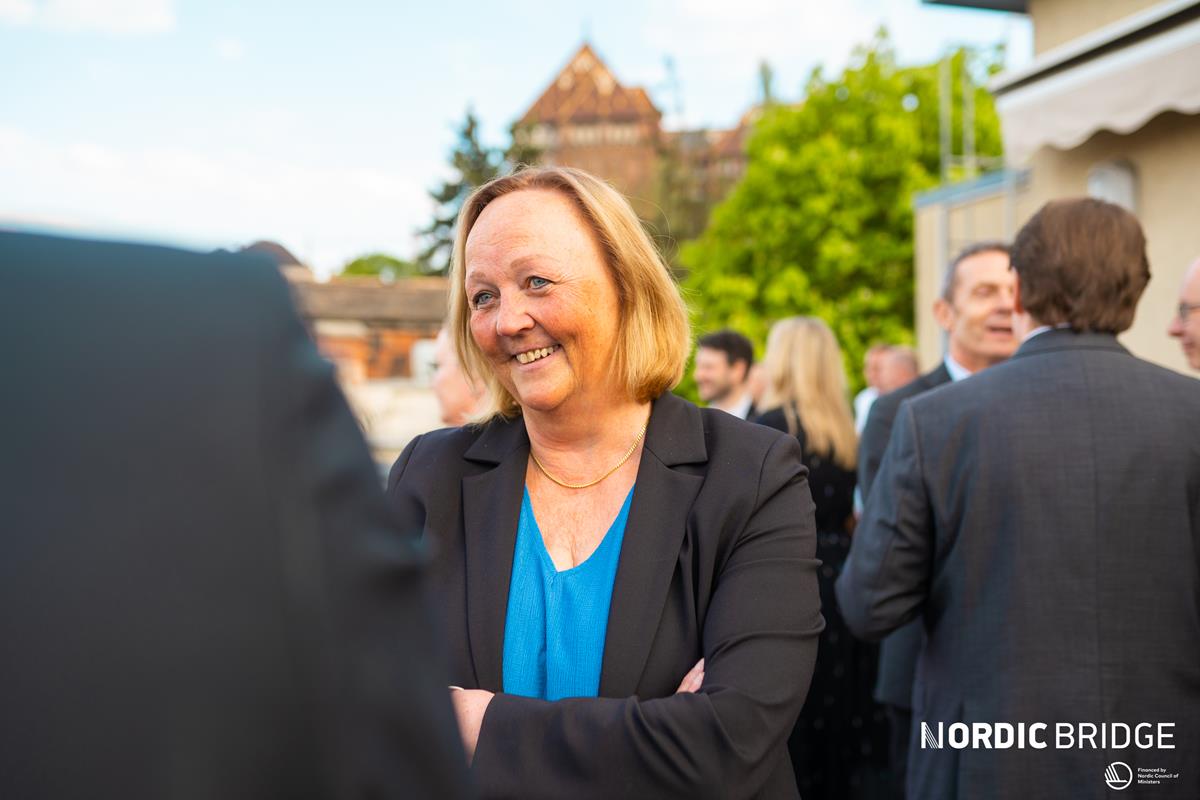Change language:
Ambassador of Norway to Hungary on cooperations, Hungarian gastronomy in Oslo, Norwegian students and community and more – Interview

Her Excellency Trine Skymoen, Norway’s ambassador to Budapest, honoured us with an interview. She talked about his first impressions of Hungary and the Hungarian people, Norway is the largest single provider of gas to Europe, Norway Grants and many more.
Daily News Hungary (DNH): The Norwegian Embassy and Residence are beautifully located next to Buda Castle. What were the most important steps in your career?
HE Ambassador Trine Skymoen: We are very lucky to have the Embassy and Residence located here. I have a beautiful view of the Parliament from my residence, which I enjoy every day.
I joined the foreign service in 1986 and my first posting was to Ivory Coast in 1988. Budapest is now my seventh posting.
Originally, I joined the foreign service because I wanted to travel, and I wanted to travel to exotic places, as far away from Norway as possible. Now, being in my fourth country in central Europe, I guess it just shows that your priorities change. Life takes unexpected turns, and I really enjoy being here.
DNH: How did your life eventually lead you to Budapest? Have you visited our country before your mission? What was your initial impression of Hungary before you came here?
Ambassador Skymoen: I was posted altogether 10 years in three of Hungary’s neighboring countries. I was posted in Vienna, Bratislava and in Belgrade, and I visited Budapest regularly. So, I wanted to be posted here because it sparked my interest when I visited, especially the beauty of the country and the hospitality of its people. So, I was very lucky to be appointed ambassador in Budapest.
DNH: And how do you view Hungary and its people now?
Ambassador Skymoen: I think what I have experienced being posted here really confirms my initial impressions. It is a beautiful country with a marvelous capital and really hospitable and nice people, who are very proud of the rich culture and traditions that exists in Hungary. It has a fascinating history, and it is really a privilege to live here.
I came here on the 1st of September 2020 during Covid-19 restrictions, so now I am really making up for the lost time, travelling as much as I can and as often as I can.

DNH: Norway has become one of Europe’s main sources of natural gas, but you have used this precious natural asset for a long time. I recall learning in primary school about Norway, the country that set an example for the whole world by investing the money that came from energy resources in education, science and other disciplines that would shape the country’s future.
Ambassador Skymoen: The day before Christmas Eve 1969 it was announced that we have found oil. A lot of oil! Ekofisk is the largest oil field ever found at sea and started the Norwegian oil adventure.
Norway is still a rather small player in the global crude market with production covering about 2 percent of the global demand. Norwegian production of natural gas covers approximately 3 percent of global demand, however, as an exporter Norway is a significant player.
Norway is the third largest exporter of natural gas in the world, after Russia and Qatar.
In recent years, Norway has supplied between 20 and 25 percent of the EU’s and United Kingdom’s gas demand. After the Russian invasion of Ukraine, Norway is the largest single provider of gas to Europe.
Nearly all oil and gas produced on the Norwegian shelf are exported.
Norway’s Parliament passed a very important law in 1990; to establish the Government Petroleum Fund, which is now known as The Government Pension Fund Global. The plan was to regularly transfer capital from the government’s petroleum revenue to the fund. The fund’s purpose is to support the government’s long-term management of petroleum revenue, and the fund has a small stake in more than 9,000 companies worldwide. It holds 1.3 percent of all of the world’s listed companies, and the value of the fund is now around 1,180 billion US. It is the largest of any sovereign wealth fund in the world. The fund has one main purpose; to help finance the Norwegian welfare state for future generations.

DNH: What were Norway’s most important decisions regarding the Government Petroleum Fund?
Ambassador Skymoen: To achieve a broad political consensus on how the fund should be managed. The less we spend today, the better the position we will be in to deal with downturns and crises in the future, the authorities can spend more in hard times and less in good times.
So that the fund benefits as many people as possible in the future too, politicians have agreed on a rule which ensures that we do not spend more than the expected return on the fund. On average, the government is to spend only the equivalent of the real return on the fund, which is estimated to be around 3 percent per year. In this way, oil revenue is phased only gradually into the economy. At the same time, only the return on the fund is spent, and not the fund’s capital. We save for future generations.
DNH: Norway Grants is a remarkable opportunity for Hungarian organizations. Can you describe its operation briefly?
Ambassador Skymoen: The EEA and Norway Grants grew into a well-established and successful cooperation platform between the three EFTA donor countries, Iceland, Liechtenstein and Norway, and the partner countries in the European Union. The agreement includes a common goal to work together to reduce economic and social disparities in Europe. In the current project period, Norway will provide approximately 2.8 billion euros in support to 15 member states.
We support projects in areas such as environment and climate change, health and childcare, conservation of European cultural heritage, research and education, Schengen measures and judiciary, social dialogue, and the strengthening of rule of law, democracy and civil society in 15 countries.
Since becoming a member of the EU in 2004, Hungary has received 288,4 million euros in funding under the EEA and Norway Grants.
Unfortunately, the programmes for the period 2014-2021 are not implemented in Hungary due to the lack of agreement on the appointment of a Fund Operator to manage the fund for civil society within the agreed deadline.
The talks between EEA countries and the EU for the next period 2022-2027 have just started.
DNH: There are slightly more than half as many people living in your country as in Hungary. Both the climate and the opportunities differ widely between the two countries. Is Hungary a popular destination among Norwegian tourists?
Ambassador Skymoen: Hungary, and especially Budapest is a very popular destination for Norwegians. The airline company Norwegian has daily direct flights between Oslo and Budapest. The beauty of Budapest and the rest of the country, and the quality and prices, especially on food, drinks and cultural programmes make it an attractive destination for long weekends.
A large number of Norwegian students not only in the capital but also in big cities such as Szeged, Pécs and Debrecen, are good ambassadors for Hungary in Norway.
DNH: Name three attractions Norwegian visitors would appreciate the most when exploring Hungary
Ambassador Skymoen: The stunning view of Budapest with the Danube, the bridges, and the architecture. Your excellent wine tradition is very popular among Norwegian tourists. The spa with the hot thermal water is a must to explore, not only the modern facilities but most importantly the traditional ones.
DNH: What is the current number of Norwegian expats living in Hungary?
Ambassador Skymoen: Around a thousand maybe, including the students. One of the largest Norwegian communities outside Budapest is the personnel at the airbase in Pápa and their families. They do important work for our common security together with colleagues from 12 countries.
DNH: And vice versa, how are we doing up there in the north? Are there many Hungarians living in Norway? Is it easy to settle down and get a job over there?
Ambassador Skymoen: After Hungary became a member of the EU and Schengen it is much easier to start studying and working in Norway. That has attracted new groups of Hungarians in addition to those 1,500 refugees who we welcomed after the 1956 revolution, and who became fully integrated and appreciated members of Norwegian society. You can come across Hungarians wherever you go in Norway even in the most remote places up north.
DNH: What is the relationship between the two countries like from a business point of view? What Norwegian investments and companies are present in Hungary?
Ambassador Skymoen: There is always scope for improvement and expansion.
The Hungarian-Norwegian Chamber of Commerce with members from both countries is a well-established organization promoting trade and investment.
Aluminum is an important export product in Norway. The biggest Norwegian company in Hungary is Hydro Extrusions, the largest extrusion plant in Europe, with over 1.600 employees in Hungary. 80 percent of their products are made for the Hungarian car industry, aluminum is a very big part of new cars now. Around 700 kg of a modern car is made of aluminum, and it is very easy to reuse. Just recently Hydro decided to start a recycling factory creating 80 new workplaces in Székesfehérvár.
Other well-known Norwegian brands are Yara and DNV, Det Norske Veritas which have been present for a long time in Hungary.

DNH: And what Hungarian products can be found in Norway?
Ambassador Skymoen: Food. In Oslo, you can find Hungarian restaurants, like Bistro Budapest, with goulash and Hungarian sausages, and lángos on the menu. And of course, Hungarian wines, which are sold in restaurants and in wine shops.
DNH: What cultural or business events has the Embassy organized recently? Would you mention some upcoming programmes we should keep an eye on?
Ambassador Skymoen: Norwegian authors, film productions and musicians are very popular in Hungary. We had several cultural events this autumn starting with a Nordic Film Festival. Seven Norwegian authors participated in the different book festivals and other programmes, for some of them, Erlend Loe, Maja Lunde and Helene Uri this was not the first meeting with Hungarian readers.
And in the coming year, we are really looking forward to the concert with Norway’s biggest rap duo, Karpe and Quickstyle. Norwegian Metal bands are also very popular here.
DNH: Last but not least, how do you feel about Hungarian gastronomy?
Ambassador Skymoen: What can I say, Hungarian food and wine are just delicious. Hungarian gastronomy is very rich and mostly based on meat. Actually, we call Budapest “a 10-kilo posting”. If you would like to add more fish to Hungarian cuisine, I can really recommend Norwegian salmon.
Get more information about Norwegian Embassy in Budapest on their official website, Facebook, and Twitter.
Read more interviews here:







